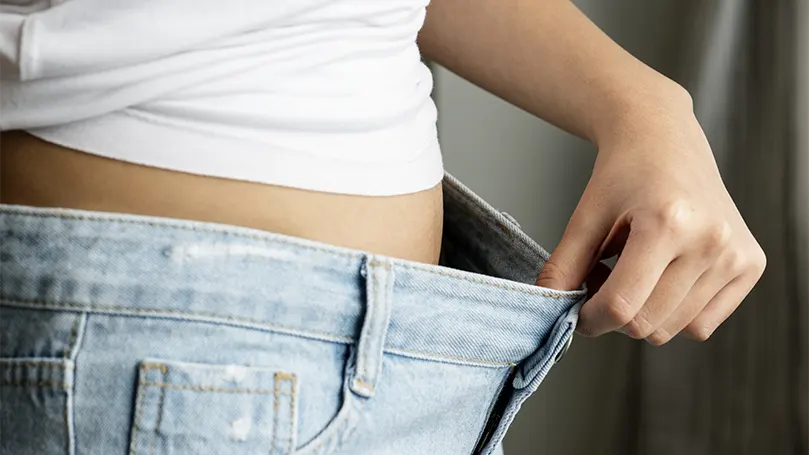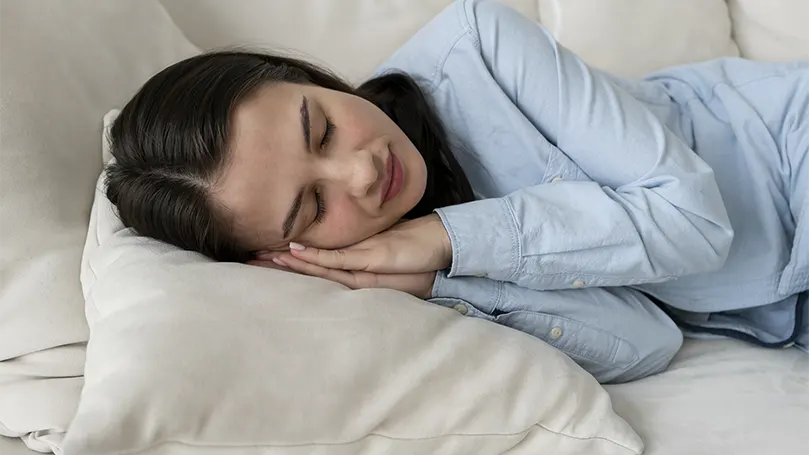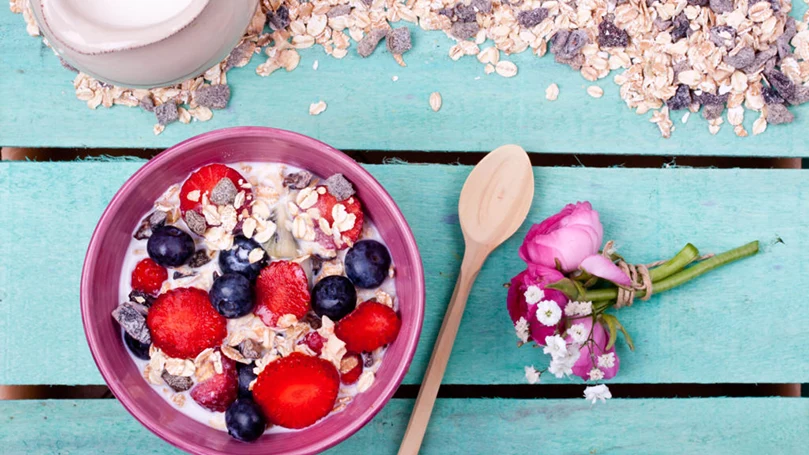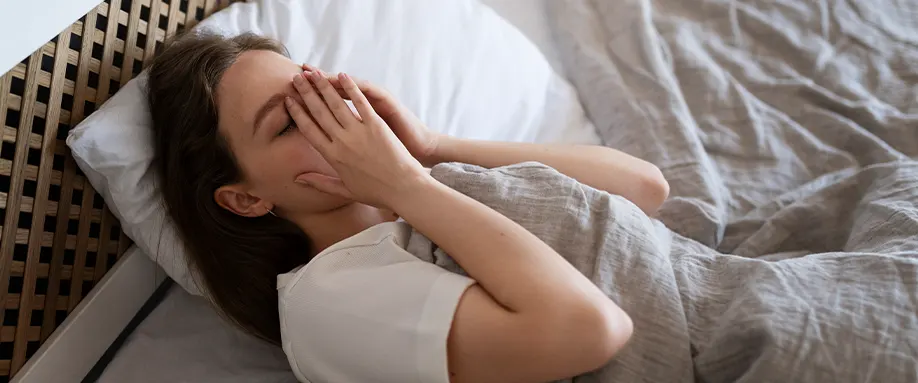What are the symptoms of stomach ulcers?
Stomach ulcers are a common yet painful problem that can make it difficult to get a good night's sleep. And, as expected, the symptoms can vary from person to person. However, there are some common signs and symptoms that most people with stomach ulcers experience. These include:

Pain/discomfort between meals
Pain is the most common symptom associated with stomach ulcers. It is usually felt as a burning sensation or pain in the upper abdomen – just below the breastbone. This pain can sometimes extend to the back.
The pain is often described as being similar to hunger aches. It is important to note that not everyone with stomach ulcers will experience pain, so you could be suffering from a peptic ulcer disease and not know it because it's not hurting.
Bloating
Next up, we have bloating. Although many don't associate bloating with stomach ulcers, it is in fact a common symptom. In fact, most people think of bloating as something that “just happens when you eat a lot”.
However, bloating associated with stomach ulcers is caused by the same factors that lead to the pain – namely, the production of too much stomach acid. When there is too much acid in the stomach, it can cause the stomach to bloat and expand – leading to that full and uncomfortable feeling – even if you haven't eaten a lot.
It can also cause pain and discomfort, at which point, most people start noticing they actually have an issue.
Nausea
Nausea and vomiting are all closely linked to stomach ulcers.
There are a few reasons why stomach ulcers can lead to nausea. One reason is that the ulcer can cause acid to back up into the esophagus, which can lead to a burning sensation and feelings of nausea. Additionally, when the stomach is empty (or not full of food), it can cause pain and cramps – which can also lead to nausea and even vomiting.

Therefore, if you find yourself struggling with nausea and vomiting, it's not likely that you also have an ulcer, but it's very much possible. If the problem persists, it's probably best if you visit a doctor.
Weight loss
Finally, weight loss is another common symptom of stomach ulcers.
This may seem counterintuitive, as most people associate weight loss with a lack of appetite. However, in the case of stomach ulcers, weight loss is caused by a combination of factors – most of which we've just mentioned.
First, the pain and discomfort associated with peptic ulcers can lead to a loss of appetite. Additionally, when the stomach is empty (or not full of food), it can lead to additional stomach acid production, bloating, and nausea, all of which can lead to additional issues, which can lead to weight loss, as the body is not getting the nutrients it needs, since you don't have the will or desire to eat.

So, if you're experiencing any of the aforementioned, it's best you seek medical treatment and test. It could be that you're suffering from ulcers caused by H. pylori infection, at which point, you'll probably need doctor-prescribed ulcer medications to neutralize stomach acid and ease the pain and discomfort.
What is the best sleep position for sleeping with a stomach ulcer?
While there's no guarantee that any sleeping position will help with a stomach ulcer, there are some positions that are more likely to temporarily relieve ulcer pain.
Namely, your best bet is to sleep on your back, with your head slightly elevated. This position will take the pressure off your stomach and allow gravity to do its thing, which can help reduce discomfort.

Another option is to sleep on your left side if you can't rest on your back. This position can also help reduce pain, as it takes the pressure off your stomach. Just make sure you don't stress your shoulders or hips. Additionally, it can help keep acid from flowing back into the oesophagus causing GERD-like symptoms and additional discomfort.
But, most importantly, whatever you do, don't sleep on your stomach. This position puts a lot of pressure on your stomach and can actually make ulcer pain worse.
Now, your best bet would be to invest in an adjustable bed. These beds allow you to tailor the bed to your sleeping position while still providing the support and elevation you need.
If you don't want (or are unable) to invest in an adjustable bed, you can also use a wedge pillow to prop yourself up. Just make sure the pillow is at least 15 cm thick so you can get the proper elevation.
Can I use medicine/drugs for stomach ulcers?
As for medication, there are a few options available that can help relieve the stomach ulcer pain and/or promote ulcer healing.
Histamine receptor blockers
The most popular type of medication (mostly because they're available over-the-counter) for stomach ulcers is histamine (H-2) blockers. Histamine is a substance that's released in the body during an allergic reaction. It's also produced in the lining of the stomach, which helps protect the stomach from the acid it produces.
However, when there's too much histamine in the stomach, it can lead to ulcers. Histamine receptor blockers (famotidine, cimetidine, and ranitidine) work by blocking histamine receptors, which help reduce the amount of acid produced in the stomach and can provide relief from ulcer pain.
Proton pump inhibitors
Proton pump inhibitors (PPIs) are another type of medication that can be used to treat stomach ulcers. PPIs (omeprazole, lansoprazole, rabeprazole etc.) work by reducing the amount of hydrochloric acid produced in the stomach, by blocking a particular action of gastric cells responsible for acid secretion. They're typically only available by prescription and are used when histamine receptor blockers haven't worked.
Antibiotics
If your stomach ulcer is caused by helicobacter pylori bacterial infection, you'll likely need to take a course of antibiotics. Antibiotics work by killing the bacteria that are causing the infection. Most often, you'll be prescribed amoxicillin, levofloxacin, tetracycline, or clarithromycin.

Antacids
Finally, we have antacids, or over-the-counter medications like Tums, Maalox, Mylanta, and Rolaids. Antacids work by neutralizing stomach acid and can provide relief from ulcer pain.
They're typically taken after meals or when heartburn or indigestion is present. However, they don't do anything to promote ulcer healing and should only be used on a short-term basis.

What should I do about my diet when suffering from stomach ulcers?
Now, if you want to make it easier on yourself and avoid the burning pain – you'll have to watch what you eat.
There are certain “trigger foods” that can make ulcer pain worse and, unfortunately, you'll have to stay away from them.
The list of food items includes:
- Citrus fruits
- Tomatoes and tomato products
- Spicy foods
- Chocolate
- Coffee and tea ( caffeinated and decaffeinated)
- Alcohol
- Fatty or fried foods
- Processed meats
Now, we know this sounds like most of the stuff we consume on the daily basis, but that's just something you have to avoid if you want to get quality sleep with a stomach ulcer bugging you.
Unfortunately, it's been proven that no particular diet is helpful – at least not long-term. But, there are some things you can do.
It is generally accepted that a diet that's high in fibre and low in fat and sugar is best. So, a lot of fibre-rich veggies (carrots, broccoli, artichokes, beans, peas), whole grains, low-fat dairy products, and lean meats (chicken, turkey).

This type of diet could help alleviate some of the symptoms associated with stomach ulcers (not ulcers themselves) and also help with conditions such as constipation and diarrhoea.
In addition, you should also make sure to eat smaller meals more frequently throughout the day, rather than large meals less often. Also, avoid eating close to bedtime so your stomach has time to digest before you shut down.
Pay attention to sleep hygiene
A lot of people believe stress is the one thing causing stomach ulcers, and while that has never been “proven”, there's quite some evidence to support the claim. So, if you want to get rid of discomfort – or at least make it go away for a while – you should focus on reducing stress in your life.
And, one of the best ways to do that is to get quality sleep by practising healthy sleep hygiene.

No screens two hours before sleep
You've probably heard this one a thousand times, but it bears repeating – stay away from screens at least two hours before sleep.
The blue light emitted by screens (phones, laptops, TVs) suppresses the production of melatonin – the hormone that makes us sleepy.
So, if you want to fall asleep easily and sleep soundly through the night, make sure to avoid screens at least two hours before bedtime.

Optimize your sleep space
Optimizing your sleep space will take no more than a day or two and it will have a profound effect on your sleep quality.
To do that, you should start by making sure your mattress and pillow provide the right amount of support and comfort.
If they're old and lumpy, it might be time to start looking for the best mattress. Also, make sure your sheets are made of breathable material like cotton or linen.

And, last but not least – keep your bedroom cool, dark, and quiet. A white noise machine can help with the latter if you're struggling to find peace.
Skip snacks and soda drinks
Don't eat or drink anything acidic, fatty or sweet close to bedtime. This goes for both food (orange juice, chocolate, chips) and drinks (soda, coffee, energy drinks). All of these can exacerbate the symptoms of heartburn and make it hard to fall asleep. So, if you want to get quality sleep – skip the snacks before bed.

Exercise
While you shouldn't do it right before bedtime, moderate exercise has been shown to improve sleep quality.
So, if you want to improve your sleep at the same time – make sure to add some moderate exercise to your daily routine.
Walking, light weightlifting or yoga sessions are all great options.

When should I see a doctor about stomach ulcers?
So, when should you see a doctor?
If you're experiencing any of the following symptoms, you should definitely make an appointment with your doctor:
- Severe pain
- Unintended weight loss
- Anaemia
- Excessive vomiting or vomiting blood.
As you can see, this list is not exhaustive, but if you're experiencing any other symptoms that are worrying you – don't hesitate to see a doctor. It's your body and your life – treat it with care.

To sum up…
Stomach ulcers can be painful and disruptive, but with the right lifestyle changes and treatment, they don't have to control your life. So, if you're struggling to get quality sleep – make sure to talk to your doctor and try out some of the tips from this article. You might be surprised by how quickly your sleep improves!















There are no comments yet
"*" indicates required fields